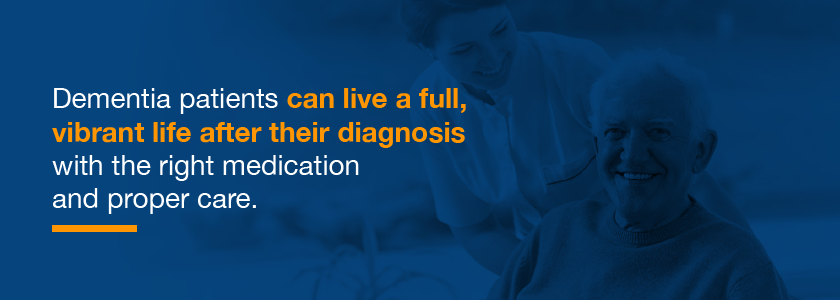As your body ages, so does your brain. Older adults may no longer be able to remember dates, the ages of their grandkids or where Cousin Stan moved in 1982. Trouble remembering information is a common problem among older adults. One-third of older adults struggle with their declarative memory, or the part of their brain that stores and brings up facts and events they once knew on command.
One of the hard parts of getting older is that the body — and the brain — don’t always work the way they’ve worked in the past. Besides being frustrated by these new developments, these changes frighten many older adults because they don’t know what’s part of the normal aging process and what’s not. The well-known link between memory problems and dementia, including Alzheimer’s disease, has left many people terrified that the smallest slip-up is a sign that they are developing this disease.
The truth is that a change in brain function is a normal part of the aging process. A completely healthy older adult may notice themselves:
- Struggling to learn and memorize new concepts or facts
- Unable to multitask
- Forgetting appointments or the names of people they’ve met before
All these slip-ups are typical, and usually nothing to feel concerned about. The inability to remember names and numbers can start in the 20s — it’s just that most people are usually too busy during that time to notice!
The reason for these changes is that the brain, like the rest of the human body, ages. Brain mass is shrinking and the chemicals it produces to influence memory and cognitive function are declining. Things aren’t as robust inside the skull as they used to be.
Just because these things are “normal,” however, doesn’t mean older adults need to accept them. After all, no one wants to forget their sister’s birthday or an upcoming doctor’s appointment. The good news is that there are ways to keep your brain healthy as you age and even improve your memory over time. Scientists have reason to believe intentionally working to improve memory and maintain healthy brain function can result in a slower overall decline and, in some cases, reverse memory loss.
How to Keep Your Brain Healthy and Active
So what’s the secret? Well, no magic formula can guarantee you the brain of a 20-something overnight. However, the importance of brain health has led to the development of some essential steps to keep your memory sharp and maintain memory function.
1. Eat Right

Eating for brain health isn’t necessarily the slogan for a hot new fad diet, but it is going to go a long way in keeping your body in top shape. Brain health and nutrition go hand in hand when it comes to protecting, and even improving, cognitive health in older adults. Research has shown the Mediterranean diet has lowered the chances of developing dementia. People who follow this method consume a lot of leafy greens, fish, whole grains, olives, nuts and vegetables.
Avoiding excessive consumption of sugar is also a proactive way to protect the brain from decline. High blood sugar, even in people who do not have diabetes, links to mental decline, especially Alzheimer’s disease. Skip that soft drink after lunch and replace it with water instead.
2. Exercise
Everyone knows physical activity keeps the body strong, but staying physically active can strengthen the brain too. Exercise increases blood flow to the brain, encourages development and connection of new brain cells and also reduces mental stress. These things are crucial because when your brain is making connections between cells and isn’t struggling with excessive stress, it is better able to process and retain information. Incorporating physical activity into your daily routine — even if it’s as simple as taking a walk every morning — will go a long way to protecting your brain as well.
3. Improve Your Levels
Cardiovascular health plays a significant role in keeping your brain operating at optimum capacity. If your cardiovascular system isn’t working as well as it should, your brain won’t be able to function as well, either. Individuals with high blood pressure are more likely to experience cognitive decline later in life. Those with high blood pressure or cholesterol also have a greater risk of developing dementia. Healthy eating and regular exercise can help lower your blood pressure or cholesterol levels, but if that’s not enough, your doctor can advise you on other lifestyle changes or medications that might help you achieve your goals as well.
4. Just Say No
Smoking causes the cortex — the part of the brain responsible for memory, perception and language — to thin out over time. The thinner the cortex, the less the brain can process. Even someone who is a lifelong smoker can improve the thickness of their cortex by deciding to quit. It’s never too late to stop smoking or use of other smokeless tobacco products.
And, while alcohol may be a “fun” way to relax with friends or celebrate a special occasion, the impact that alcohol has on your brain’s short- and long-term function isn’t any better. As a general rule, cutting out all drugs and tobacco products will maximize brain health.
5. Pay Attention to Your Mental Health
Mentally healthy people tend to have better cognitive function than those who don’t. An older adult who struggles with depression, anxiety or high levels of stress may find they cannot recall information as well as their peers. When you are feeling stressed out and struggling to cope with mental health issues, it also compromises your brain health. If you suspect you are struggling with anxiety, depression or stress, talk to your doctor and come up with a plan to help your body get the relief it needs to operate as it should.
6. Spend Time With Friends
Regularly socializing goes a long way in challenging the brain and keeping older adults mentally sharp because it gives them a chance to get out, share ideas and learn new things together. There is even some scientific evidence to suggest socialization can lower the risk of dementia for older adults. It can be challenging for some older adults because they may have moved away from their friends or lost several people who are close to them in recent years. But, it’s never too late to make new friends! Cultivating new friendships, especially with others who share common interests such as film, gardening or physical fitness, can challenge older adults to stay active and exercise their bodies and their brains regularly.
7. Find Ways to Stimulate Your Brain
Just like you exercise your body, it’s critical to perform healthy brain exercises too. Older adults should make it a point to regularly pursue regular intellectual pursuits, such as reading books, solve a Sudoku puzzle or playing chess. You can go back to school, either to take a class here and there or to pursue the degree you always wanted to earn. It is also an excellent way to incorporate a physical challenge by pursuing activities that push the mind and body, such as painting or drawing.
8. Monitor Your Medications
Mixing certain over-the-counter or prescription medications can impact brain function, so talk with your doctor and pharmacist before adding or changing medications. Taking too much of one or more drugs, or taking the wrong ones, can also impact the brain’s ability to function the way it should.
9. Avoid Falling
 Emergency rooms treat 2.8 million senior adults annually because of injuries related to falling. Besides breaking bones, falling puts older adults at greater risk for memory issues as well. Why? If an older person falls and hits their head, they may sustain an injury or even permanent damage to their brain. Or, in some cases, they may suffer other injuries that require medication — which can also cause brain function and memory issues.
Emergency rooms treat 2.8 million senior adults annually because of injuries related to falling. Besides breaking bones, falling puts older adults at greater risk for memory issues as well. Why? If an older person falls and hits their head, they may sustain an injury or even permanent damage to their brain. Or, in some cases, they may suffer other injuries that require medication — which can also cause brain function and memory issues.
10. Prioritize Healthy Sleep Habits
When the brain is sleep-deprived, its cells don’t get the rest they need to function normally. The result? Impaired mental function. The impact sleep deprivation has on the brain is akin to the feeling of being drunk. It impairs judgment and perception of what’s going on around you. Reaction times are slower and memory lapses can also occur. If you’re trying to maintain — or improve — your brain’s health and well-being, the National Sleep Foundation recommends adults 65 and older get seven to eight hours of sleep each night.
Signs an Older Adult May Have Cognitive Decline
Some mental decline is natural in adults as they age. So how can you tell the difference between regular aging and dementia?
Dementia is an umbrella term for a variety of conditions that increase the rate at which a person’s brain function deteriorates. It will also progress beyond forgetting an appointment into more serious mental decline. Some of the signs of dementia include the following.
1. Forgetfulness Interferes With Their Daily Life
Does their forgetfulness lead them to forget to pay bills, turn off the stove or take medication at the proper times? Everyday tasks, such as operating a computer or folding laundry, may become increasingly difficult. A lifelong coffee drinker may suddenly forget how to use their coffeepot. Someone who enjoys making clothes may not remember how their sewing machine works.
2. Their Memory Is Failing
Everyone forgets things sometimes, but someone with dementia will struggle to retain information, especially details they have recently learned, such as instructions about when to take a certain medication. They may also have trouble remembering the value of personal hygiene, ultimately forgetting to shower, flush the toilet or perform other daily self-care tasks that have never posed problems for them before.
3. Their Problem-Solving Skills Are Lacking
A person with dementia will gradually become unable to follow directions or recipes, and they may have a hard time problem-solving when issues arise. These can take a variety of forms, such as being unable to follow directions to a friend’s new home or becoming confused when trying to follow the steps of a complicated process.
4. They Avoid Social Situations
Someone with dementia may steer clear of social situations because it becomes increasingly difficult to follow and participate in conversations. It can also be difficult for those who have relied on their hobbies for socialization and then find they can no longer remember how to participate. In some cases, a person’s ability to speak may also become compromised, leaving them unable to communicate with others.
5. Their Personality Changes
They may become increasingly depressed, anxious or irritable. And, in some cases, they may lose their “social filter,” or inhibitions that would usually prevent them from saying and doing things they shouldn’t when they are around other people.
6. They Regularly Lose or Misplace Things
Sure, everyone loses their car keys once in a while, but for someone with dementia, losing basic items such as keys or reading glasses may become a daily occurrence. And, over time, they may misplace more meaningful things, such as a check or valuable family heirloom. Over time, they may become increasingly frustrated and even have been known to accuse others of stealing from them.
There is often a lot of confusion about the difference between dementia and Alzheimer’s disease. Dementia is a broad term that includes Alzheimer’s disease, among other memory disorders. They both result in impaired communication, memory loss and a gradual decline in thought process. However, there are some differences, and it’s essential to know the signs of Alzheimer’s as well.
- Depression
- Impaired judgment
- Apathy
- Disorientation
- Behavioral changes
- Problems remembering recent conversations or events
- Problems speaking, swallowing or walking as the disease progresses
About Our Home Care Services for Alzheimer’s and Dementia

It can be scary when the doctor brings up the word “dementia.” Most people associate this condition with the older adults they’ve seen who cannot remember anything and require constant care and attention. But, thanks to incredible advances in modern medicine, there is hope. Dementia patients can live a full, vibrant life after their diagnosis with the right medication and proper care.
Medication won’t stop or reverse dementia. However, it can slow it down and help your loved one enjoy a better quality of life. And, with the right medication and treatment, dementia patients can often continue to live in their home and maintain a high level of independence.
As dementia progresses, it often becomes necessary to hire a professional caretaker to assist with medications, meals and more. Even for adults who are near loving, engaged family members, the day-to-day care requirements may become too much.
CareGivers of America is a nurse registry service that connects families with qualified, experienced caregivers who can take care of their older loved ones when they can’t be there. Our caregivers are background-checked and insured before they ever set foot in your home. We can also connect you with caregivers who can work on a flexible schedule, which means they can be there when you need them.

When you contact CareGivers of America, we will perform a free in-home evaluation to determine what your needs are, and then we can arrange interviews for you with caregivers we think are a good fit. Once you find a caregiver you like, you can take advantage of our same-day service set up so you can have the peace of mind that comes with knowing your loved one is receiving all the care and attention they need.
CareGivers of America services several South Florida communities, including Miami Beach, North Miami, Aventura, Coral Gables, Cutler Bay, Sunny Isles Beach, Bal Harbour, Pinecrest, North Miami Beach, Surfside and Key Biscayne. To learn more or begin the process of setting up in-home care for your loved one, contact CareGivers of America today.








